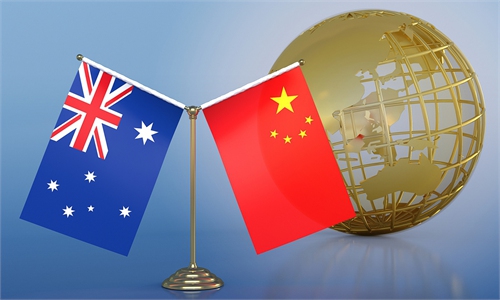
Bottles of Australian wine on the shelf of a supermarket in Hangzhou, East China's Zhejiang Province on November 27, 2020 Photo: VCG
With China and Australia making significant efforts to repair their relations, the warming-up of bilateral economic and trade ties is expected to lead to the settlement of more trade disputes, which is hard-earned and needs to be cherished by both sides.
Australian Trade Minister Don Farrell said on Sky News on Sunday that he was hopeful China would lift tariffs on Australian wine once a review finished by the end of March, and that good progress was also being made in relation to lobster imports, Reuters reported.
Farrell's optimistic expectations not only boost the confidence of the local business community in resolving the China-Australia wine dispute, but also symbolize the positive progress of the two countries in resolving their differences and finding new ways of cooperation through dialogue and consultation.
It is no secret that Australia wants China to lift its tariffs on Australian wine, which were introduced in 2021. Since China announced in August 2023 plans to end anti-dumping and anti-subsidy duties on barley imported from Australia, many in Australia have been expecting the lifting of tariffs on wines.
China's Ministry of Commerce (MOFCOM) appeared open to the issue. In September 2023, a MOFCOM spokesperson said that China was ready to work with the Australian side to seek a prompt resolution of disputes, including China's anti-dumping and countervailing duty measures on wine from Australia and Australia's anti-dumping and countervailing duty measures on certain products from China, based on settling the barley dispute.
Despite setbacks in the relationship between China and Australia since 2020, positive signs in economic and trade relations suggest that the two sides still have strong potential for cooperation and share broad common interests. While trade disputes may be inevitable for countries, they should not be politicized or labeled with ideological tags, otherwise, conflicts could be exacerbated rather than resolved.
While managing differences may be challenging, the benefits of constructive engagement are still abundant. For instance, Australia's barley sales to China soared after Beijing scrapped tariffs, with China taking 90 percent of Australia's exports of barley in December 2023, Bloomberg reported.
Maintaining the increasing momentum of China-Australia trade requires efforts from both sides. During the meeting with Farrell in Abu Dhabi, United Arab Emirates, on February 26, China's Minister of Commerce Wang Wentao said that China-Australia ties showed strong resilience, and he hoped that Australia would pay attention to and actively promote the resolution of specific problems encountered by Chinese enterprises in Australia.
Addressing the concerns of enterprises on both sides is one of the prerequisites for creating a sound business environment for bilateral economic exchanges. This does not represent a "compromise," and the national security of China and Australia will not be harmed. On the contrary, both sides will benefit from strengthened mutual trust, laying the foundation for closer cooperation.
China-Australia economic and trade cooperation has been highly complementary, as China is a large market while Australia is a stable long-term supplier of minerals and energy resources to China.
The highly complementary nature of the two economies is bound to deepen under the economic policy orientation of both countries.
According to the Chinese government work report submitted on March 5 to the national legislature, to pursue higher-standard opening-up and promote mutual benefits, China will promote alignment with high-standard international economic and trade rules, and steadily expand institutional opening-up.
If anything, the goal of pursuing high-level opening-up sends a clear signal that China is willing to share development opportunities with the rest of the world, representing more market space in China for foreign businesses.
This is certainly a welcome development for Australia, which is paying increasing attention to economic ties with Asia. With the rise of Asian emerging economies, Australia is expected to gain more economic opportunities and development space through trade exchanges and cooperation with Asian countries. China is one of its indispensable Asian partners.



